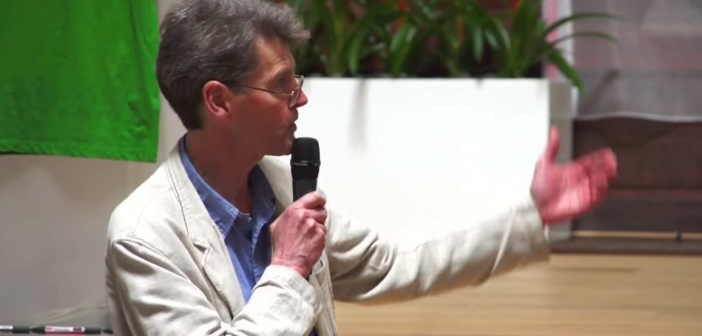This is a personal reflection of grief on the loss of Neil Faulkner which I hope will bring some comfort to Neil’s comrades and friends. My heart, and sincere condolences, goes out to Neil’s family who have lost a beloved husband, father and companion.
In 2012, seeing their salaries slashed by over half, the Association of Greek Archaeologists launched an international appeal against massive government cuts and to stop the targeted, professional looting of archaeological sites and museums. Here in the UK, Neil emailed the Greece Solidarity Campaign (GSC) saying he really ‘ought to do something.’ In his self-effacing way, Neil explained that he had ‘quite a high profile’ in archaeology, knew Greece well, and had just had a book out on the Ancient Greek Olympics. He sent a list of ideas for what the campaign could do but stated that he did not ‘do Facebook’ so I would have to connect him with the Greek archaeologists some other way.
Neil’s intervention was remarkable – he quickly had an event called Archaeologists Against Austerity: Solidarity with Greece arranged at UCL’s Institute of Archaeology, plus further events at Bristol University and in Newcastle which allowed archaeologists Despina Koutsoumba and Fotis Georgiadis to come to the UK, speak at these events and make headlines in Greece.
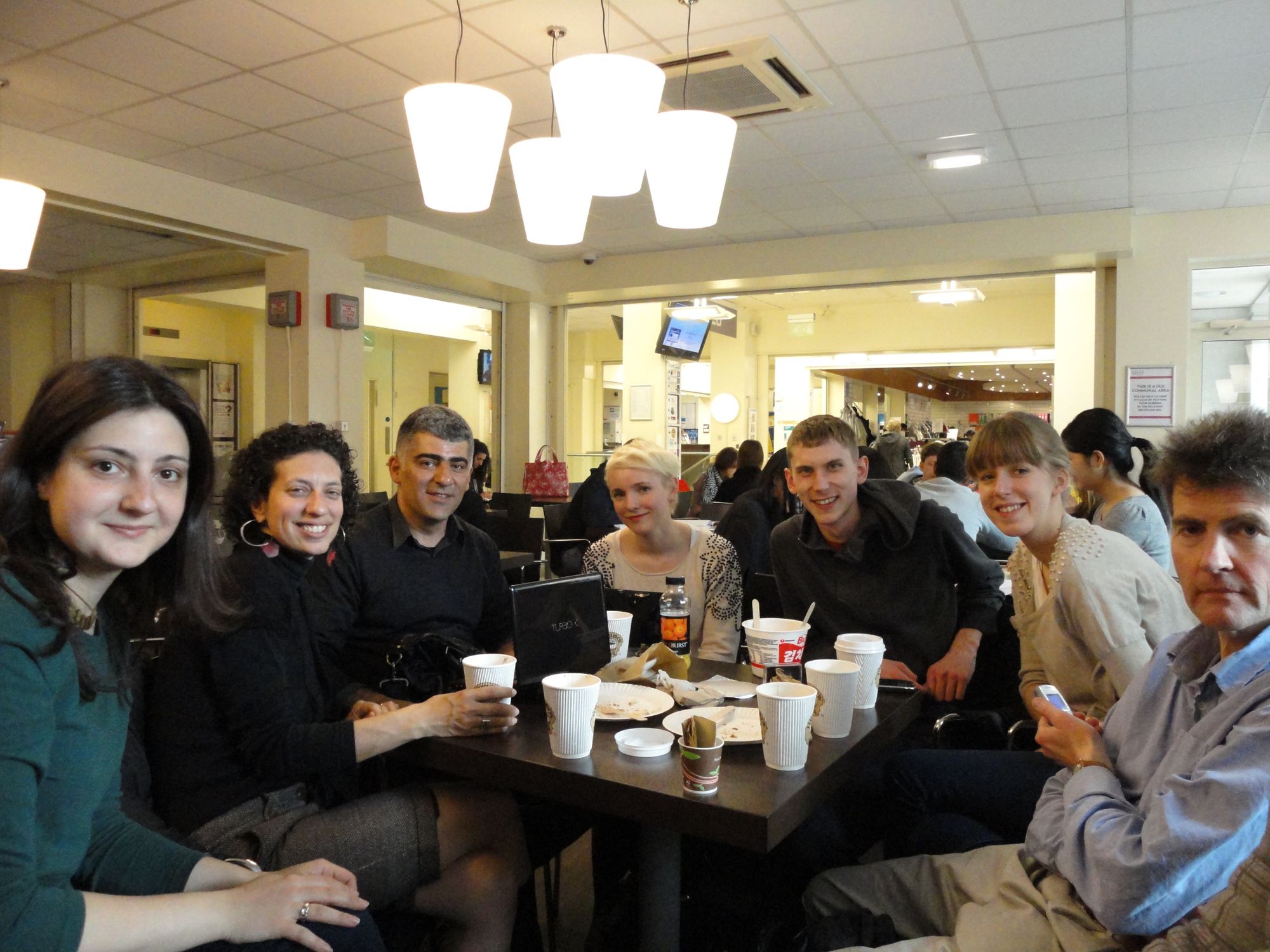
Neil’s good friends in archaeology supported the tour, some of the establishment boycotted the events as they were unhappy at the politics. The best bit was holding a protest inside the British Museum, with Despina and Neil holding up a banner saying Can’t Pay Won’t Pay – Solidarity With Greece, and demanding the return of the Parthenon Marbles.
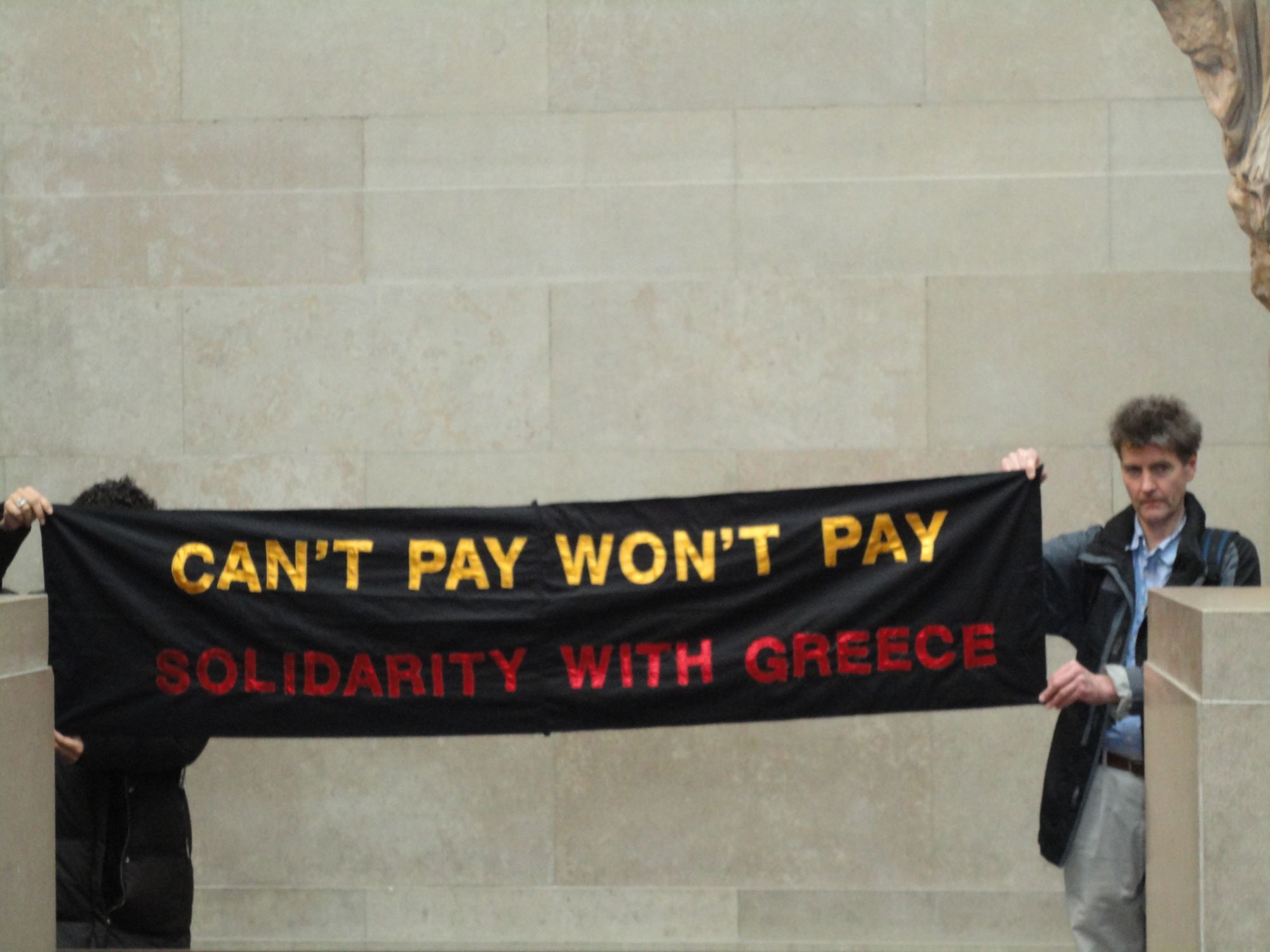
Here is Neil at his best explaining the living breathing significance of these stolen revolutionary treasures:
“History is sanitized. The role of the people in making their own history, the idea that it’s people organising themselves to bring about revolutionary change is not something that our rulers want us to celebrate and talk about. So what happens is that the objects are ripped out of their original contexts and treated like art objects which you approach in a hushed awe in an environment like this.”
This ‘People’s History’ approach was reflected in a recent letter Neil published in support of the ‘ritual killing’ of the Colston statue by Black Lives Matter protesters, a cause which for Neil represented huge power and hope. Neil was deeply committed towards making the world a better place. He once wrote to me:
‘BTW I became a revolutionary on the Grunwick picket-line in 1977. A group of Asian women sacked for joining a trade union by a sweatshop boss, and hundreds of police mobilised to smash a way through the mass picket to get busloads of scabs into the factory. That was when this innocent grammar-school boy from Tunbridge Wells began to grow up!’
Neil was also heavily involved in organising a South Africa disinvestment campaign on his campus in the late 70s, and then worked for two years in the head office of the Anti-Apartheid Movement. He was also instrumental in creating the No Glory In War commemorative WWI campaign with Stop The War Coalition and Jan Woolf. You can read more about his political work here.
Anyone who met Neil knew he was whip smart with an extraordinary intellect and capacity for writing brilliant books including the extraordinary A Radical History Of The World. I was suitably intimidated when I wrote to Neil in his role as series editor at Pluto Press to ask him to take a look at a book idea I’d had. He was immediately warm, kind and encouraging: “If this is your first such venture and you are unsure about all this book publishing stuff, very happy to talk on the phone.”
Neil gave me the courage to write Stitched Up – The Anti-Capitalist Book Of Fashion and to do it to the best of my ability. He was an intellectual safety net who I could explore Marxist theory with and who expected me to be smart and inquisitive, to read extensively and push ideas forward. In the acknowledgements I wrote: ‘To Neil Faulkner for polishing this book from a rough diamond to something I wanted everyone to read. For patience, guidance, and letting me phone you at all hours to discuss topics from Chanel to use-value.’ (Last time I phoned him to discuss something random and fashion related was to get his thoughts for this article on Klarna and debt schemes. Once again, his answers to my questions made everything click into place.) When the book launched, I was so proud to share a platform with Neil, he was warm with the audience and also very funny – though sadly he did not wear one of his definitive waistcoats to the event.
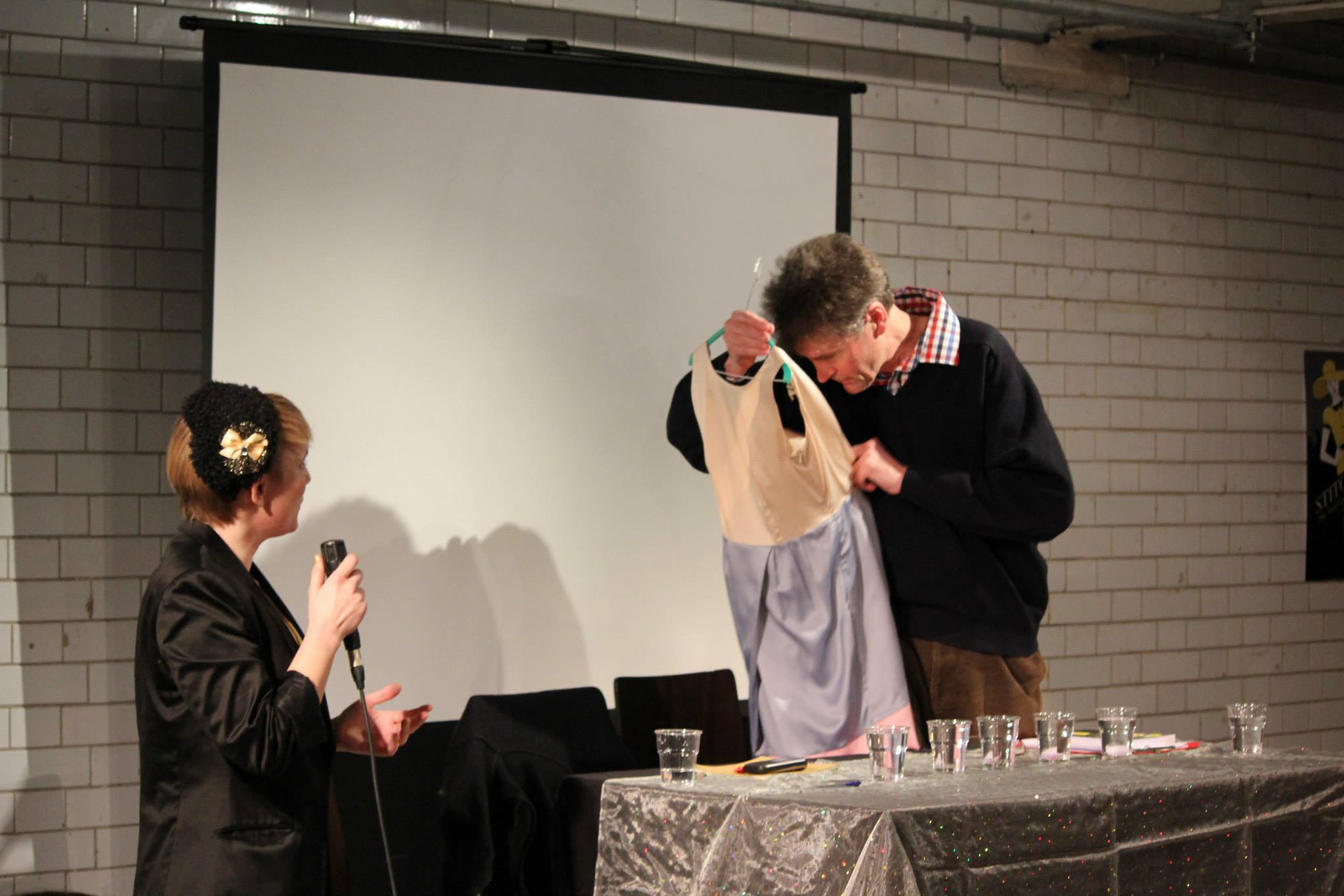
I saw Neil’s ability to inspire confidence in people extend through the work of the Brick Lane Debates a political group whose aim was to mix politics with culture and attract wide audiences to discuss and act on crucial topics of the day. The group was mostly in their twenties and thirties and we punched well above our weight and ahead of the times – holding large symposia in East London – Changing The Climate, We Should All Be Feminists, and I Can’t Breathe. Neil provided energy and intellectual vigour to the creation of this work.
Last night, having learned of Neil’s passing, I sat in candle light with a friend who I met through Brick Lane Debates and we talked about Neil. About his brilliant public speaking, his compassion and insight into a truly remarkable range of subjects. My friends talked about a formative event called Capitalism 101 which we ran at Housmans Bookshop – Neil would talk about capitalism and how it intersected with an issue in society, helping people to join the dots before everyone split into discussion groups. My friend remembered in great detail the Capitalism 101 on workplace mental health (long before it was de rigour to talk about mindfulness) where people felt comfortable enough to talk about the extreme levels of anxiety and stress they were being subjected to at work and how Neil prompted people to understand that this was not something we should accept as an individual problem but how we should see it as part of capitalism which must be pushed back on and dismantled.
We then got to talking about the This Changes Everything conference at Friends Meeting House – it was based on Naomi Klein’s book of the same name and over video link she told the packed audience it was the most exciting thing to ever happen in her life as a writer. It was an urgent call to action on climate change, pre-dating XR. It is one of my biggest regrets that the Left still has not managed to build an anti-capitalist movement on the climate. Neil was instrumental to creating This Changes Everything and as anyone who has had the pleasure of working with him on a political project will know he brought bucket loads of organisational energy and ideas, giving the project a serious political backbone. In a world where much of the organised Left has traditionally dismissed climate change as ‘not a priority’ or even more stupidly ‘a middle class problem,’ Neil understood it as THE defining global issue of capitalism and for that directional leadership I will always be truly grateful.
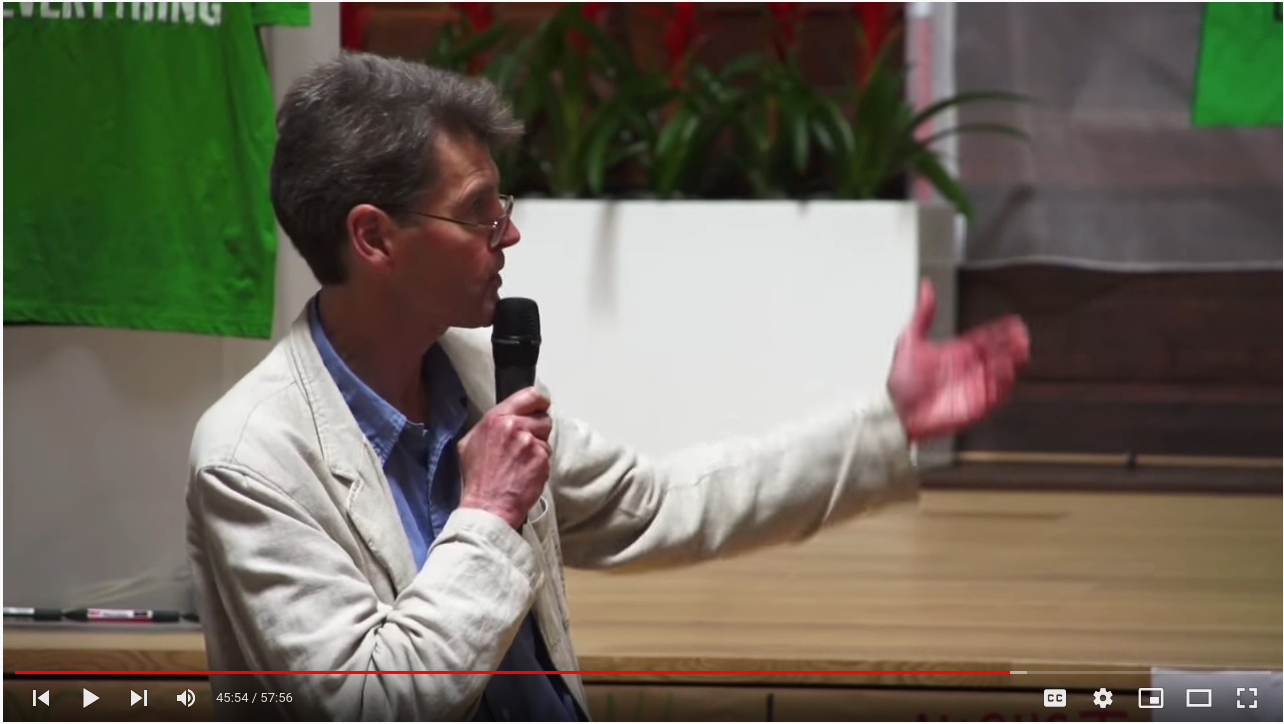
Having spoken to people and scrolled through Twitter to see people publicly mourning Neil’s loss, one word comes up time and again: Mentor. Looking up the dictionary definition of mentor brought me to tears once again – ‘someone who teaches or gives help and advice to a less experienced and often younger person.’ Neil’s heart was so big, his patience so endless, his capacity for both learning and imparting knowledge so wide, and his revolutionary spirit so strong. What gives me comfort is to look around at the people he mentored and see them doing remarkable things – whether with Anti-Capitalist Resistance which he co-founded, the climate movement, social justice campaigns, Momentum, trade unions, and of course archaeology. People leading in their field, keeping revolutionary flames burning, fighting for justice, and being better kinder people. Neil’s impact lives on far beyond his tragic, untimely and utterly unfair death at just 64. In grief I believe all we can do is make his work live on through our actions.
I will never stop missing Neil. I am crushed by the certainty that I will never know another like him. His intellect and insight were one thing, but equal irreplaceable is the joyful, funny, brave human being who always signed his emails to us with these words –
Love Neil.

